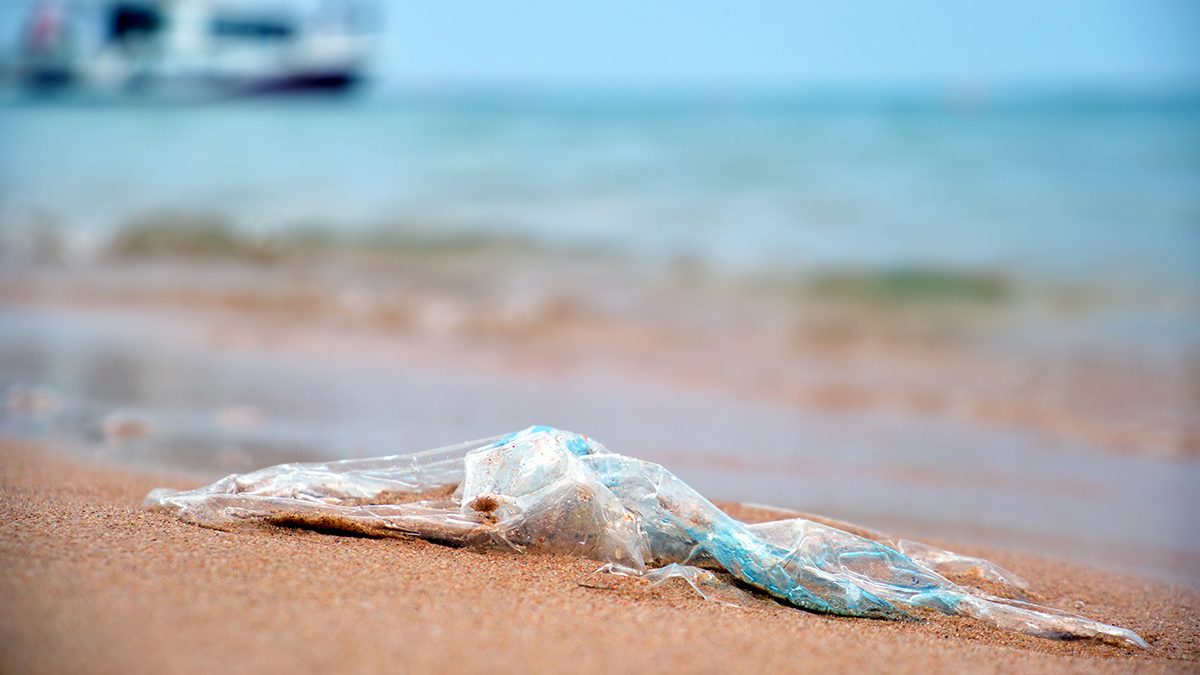Shoppers may use a plastic bag for only a few minutes before tossing it in the trash. Inefficient waste disposal, however, may allow that bag to find its way into streams and, ultimately, coastal ecosystems. There, plastic pollution can imperil marine plants and animals as well as the economic value of beachfront businesses.
“Plastic bags are designed to be single use. They’re designed to be lightweight. Even if we’re trying to properly manage them, they just get into the environment more easily than other plastics,” said Erin Murphy, ocean plastics science and research manager at the Ocean Conservancy.
“These [plastic bag bans] are effective policies, regardless of the scale of governance in which you implement them.”
While many states and municipalities have plastic bag bans or require fees for customers who want a bag, there is no national policy that aims to reduce the number of plastic bags used in the United States.
But a study published last month in Science shows some promising results: In places with bag bans and fees, the number of plastic bags found on local beaches and shorelines has dropped significantly.
“A lot of the time, communities don’t feel like they can implement policy that will directly impact their communities and directly benefit their communities. This study showed that whether it’s a town or state, these [plastic bag bans] are effective policies, regardless of the scale of governance in which you implement them,” said Murphy, who was not involved in the research.
Analyzing the Trash
Study authors Anna Papp and Kimberly Oremus examined data collected from 45,067 shoreline cleanup events between 2016 and 2023. During these events, organized by the Ocean Conservancy, participants collected trash along a beach and logged their findings into the Trash Information and Data for Education and Solutions (TIDES) database.
Plastic bags are the fifth most common item found during these shoreline cleanups, making up 4.5% of all cataloged trash. (Some of the more unusual items logged include golf balls, Mardi Gras beads, and fake nails.)
Papp and Oremus cross-checked the cleanup data with 182 plastic bag policies around the United States that were enacted between 2017 and 2023. The discrepancy between the dates of the cleanup data (starting in 2016) and the policy data (starting a year later) allowed the researchers to use the 2016 data as a control to evaluate how trends in plastic bag litter may have changed in response to local or state-level regulation.
“Comprehensive data on plastics in the environment can be challenging to find, so the cleanup data offered a new way of measuring plastic bag litter in the environment. This, combined with the wide reach of bag policies in the U.S. in recent years, made our study possible,” said Papp, an environmental economist at the Massachusetts Institute of Technology.
A Broad Spectrum of Bans
Across the country, a hodgepodge of legislation exists to manage plastic bag waste, from strict bans (like the ones implemented in New Jersey, where single-use paper bags are also limited), to partial bans (like the ones in California, targeted at large retailers), to required fees (as in Oregon, where retailers must charge at least 5 cents for a thick, presumably reusable plastic bag). In addition to statewide legislation, hundreds of municipalities have their own plastic bag policies.
“During our data collection phase, I was initially surprised by the reach of plastic bag policies. We estimate that now one in every three Americans lives in an area with some bag policy,” said Papp.
Papp and Oremus were able to document the effectiveness of such policies, regardless of their reach. In places where some form of plastic bag legislation exists, data showed a 25%–47% decrease in the proportion of plastic bags recovered in coastline cleanups. Although all policies aimed at reducing plastic bag litter were effective, researchers found that those implemented at the state level correlated most strongly to reducing the amount of plastic bag waste found during beach cleanups.
“In some ways it’s like, well, of course, if you use fewer plastic bags, you’re going to find fewer plastic bags on the beach, but it’s good that [researchers] documented that in a quantitative way,” said Susanne Brander, an ecotoxicologist at Oregon State University who was not involved in the study. “We need those data in order to convince additional lawmakers and agencies to take this seriously and to think not just about plastic bags, but about other single-use items as well.”
—Rebecca Owen (@beccapox.bsky.social), Science Writer

